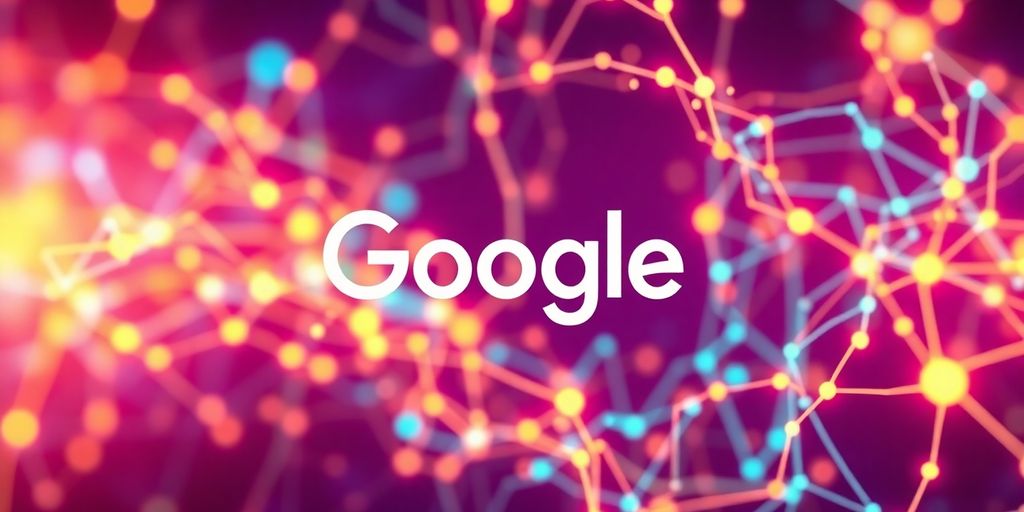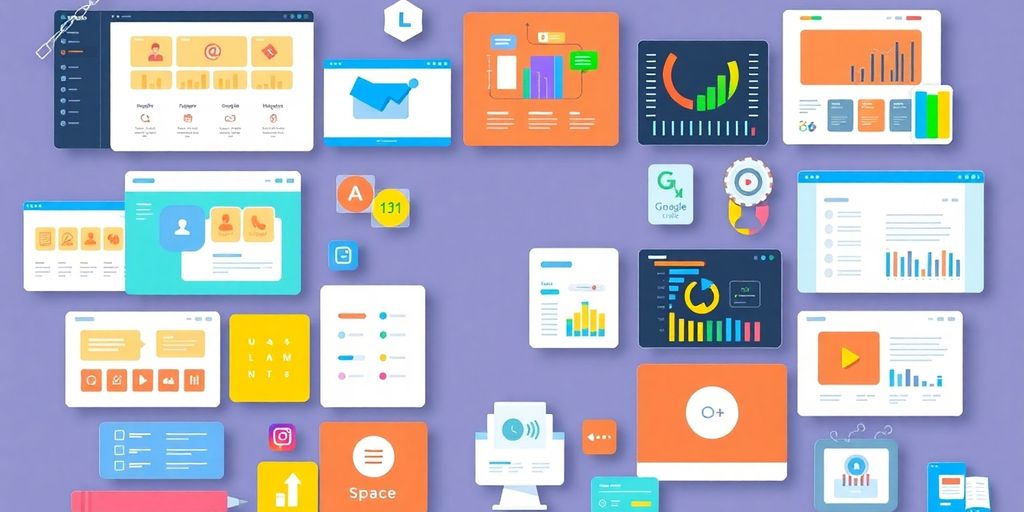Google’s Annual Report: Unpacking Income from AI Products in 2025

So, Google’s 2025 annual report is out, and it’s a big one, especially when you look at how much money they’re making from all their AI stuff. It feels like AI is everywhere now, right? From how we search for things to how businesses use their cloud services. This report really breaks down where that income is coming from and how Google is planning to keep that money coming in. It’s not all smooth sailing, though. There are some tricky parts, like making sure the AI doesn’t mess up and keeping regulators happy. Let’s check out what’s going on with Google’s income from AI products in 2025.
Key Takeaways
- Google’s Q2 2025 earnings show strong revenue growth, with AI playing a big part, especially in Google Cloud which grew 29%. Search ads also did well, growing 14%, which helped ease worries about AI hurting that business.
- The company is putting a lot more money into AI infrastructure, increasing its 2025 capital expenditure forecast to $85 billion, showing a serious commitment to leading in AI.
- Google’s plan to make money from AI involves protecting its main advertising business, pushing hard into the enterprise market with Google Cloud, and using its existing products like Android and YouTube to keep people in its system.
- Google Cloud is doing really well in the business world, partly because of tools like Vertex AI, which makes it easier for companies to use machine learning. Owning their whole AI setup, from hardware to software, is a big selling point.
- While AI is boosting search, there are worries that AI summaries might mean fewer clicks on ads, creating uncertainty about how this change will affect Google’s advertising income in the long run.
Google’s AI-Fueled Financial Performance in 2025

Q2 2025 Earnings: AI Driving Revenue Growth
So, Google dropped its Q2 2025 earnings report, and wow, things are looking up. Total revenue hit a cool $96.43 billion, which is pretty solid and beat what most people were expecting. A big chunk of that success comes from their AI efforts, really pushing things forward across the board. It seems like all the investment in AI is starting to pay off, which is good news for everyone watching the company. This growth really shows how much AI is becoming a central part of their business strategy, impacting everything from cloud services to their core search products. It’s clear that AI isn’t just a side project anymore; it’s a major revenue driver. You can see the full details of their financial performance on Alphabet’s Q2 2025 report.
Operating Income Surge and Margin Expansion
Beyond just revenue, Google also saw a significant jump in its operating income, which went up by a hefty 32% to $31.27 billion. That’s a big deal. What’s even more interesting is that their operating margins expanded to 32.4%. This suggests they’re not just making more money, but they’re also getting better at managing costs and running things efficiently, even with all the spending on new tech. It’s a sign that the company is becoming more profitable as it grows, which is always a good sign for investors and for the company’s long-term health. This kind of improvement shows a real focus on making sure growth translates into actual profit.
Capital Expenditure Increase for AI Infrastructure
To keep this AI momentum going, Google is really doubling down on its infrastructure. They’ve upped their expected capital expenditure for the entire year 2025 to $85 billion, a big jump from the earlier $75 billion estimate. Most of this extra cash is going straight into building out their AI and cloud computing capabilities. Think more data centers, more powerful hardware – basically, all the stuff needed to run these advanced AI models. It’s a clear signal that Google sees AI infrastructure as the foundation for future growth and is willing to spend big to stay ahead in this competitive space. This investment is pretty much a bet on AI being the future, and they want to make sure they have the best setup.
Monetizing Intelligence: Google’s AI Commercialization Strategy
Google’s approach to making money from its AI advancements is pretty smart, really. It’s not just about having cool tech; it’s about how to turn that tech into actual cash. They’re doing this in three main ways. First, they’re making sure their old reliable, the advertising business, stays strong and even gets better with AI. Then, they’re going after businesses big time with their cloud services, which are getting a big AI boost. And finally, they’re making their existing products, like phones and software, even more sticky by adding AI features that people will want to keep using. It’s a layered strategy that covers a lot of ground.
Defending and Evolving Core Advertising Business
It might seem like AI summaries in search could hurt ads, but Google says its AI Overviews are actually making money at the same rate as the old search results. They’re testing this a lot. The idea is that AI can handle more complicated questions, the kind that have more buying intent. Think about asking for running shoes for a specific problem – that’s more likely to lead to a sale than just typing “shoes.” Google is also rolling out new ad tools that use AI to manage campaigns automatically. Advertisers can focus on their goals, and Google’s AI figures out the best way to show the ads across all its platforms, like Search, YouTube, and Gmail. They want ads to feel like a natural, helpful part of the new AI-powered search experience.
Aggressive Enterprise Market Expansion via Cloud
Google Cloud is really pushing into the business world, and AI is the main reason why. They’ve been slowly gaining ground on competitors like Amazon and Microsoft. In early 2025, their share of the cloud market went up to 12%, and their revenue jumped 28% compared to last year. A big chunk of that growth is thanks to businesses wanting AI tools. The main product they’re using for this is Vertex AI. It’s a platform that brings together all of Google’s machine learning tools, making it easier for companies to build and use AI. It covers everything from getting data ready to training models and then putting them to use. This platform is how Google is getting its AI innovations into the hands of businesses.
Deepening Ecosystem Lock-in with Consumer Products
Google has a massive user base across its products, and they’re using AI to make those products even more essential. Think about billions of people using Search, Android, and Chrome every day. AI features like AI Overviews in Search, Gemini on Android phones, and new AI tools in Google Workspace (like Docs and Gmail) are making these services more helpful and harder to leave. Even their Pixel phones are getting advanced AI features. This creates a cycle: more users mean more data, which helps train better AI, which makes the products more attractive, bringing in even more users. It’s a powerful way to keep people within the Google family.
Google Cloud’s Ascendancy in the Enterprise AI Market

Google Cloud is really making some serious moves in the enterprise AI space. It feels like just yesterday they were playing catch-up, but now they’re a major player, especially with their AI services. You can see this in their market share, which has been steadily climbing. In fact, between Q1 2022 and Q2 2025, Google Cloud gained a solid 6.4 percentage points, moving from 19.1% to 25.5%. That kind of growth, alongside Microsoft, is pretty much all thanks to the demand for AI. It’s clear that businesses are leaning heavily on Google for their AI needs.
Vertex AI: Simplifying the Machine Learning Lifecycle
At the core of Google’s enterprise AI push is Vertex AI. Think of it as Google’s all-in-one platform for machine learning. It pulls together all their ML tools, making it way easier for companies to handle the whole process, from getting data ready and training models to actually putting them to use and keeping an eye on them. It’s designed to cut down on the complexity, which is a big deal when you’re talking about enterprise-level AI projects. This platform is really where Google is showing off its AI smarts to businesses.
Full-Stack Ownership as a Key Differentiator
What really sets Google apart is that they own their entire AI setup. Unlike some competitors who partner up, Google controls everything from the custom hardware, like their TPUs, all the way up to their Gemini models and the Vertex AI platform itself. This means they can fine-tune everything for maximum performance and cost savings. It’s a pretty compelling argument for businesses looking for efficiency and power in their AI infrastructure. This kind of control is a big advantage in the competitive cloud market.
Strategic Talent Acquisitions to Bolster Enterprise Offerings
Google isn’t just building out its tech; they’re also snapping up talent. The recent big deal to bring in key people from an AI coding startup is a prime example. This move is clearly aimed at beefing up their offerings, especially in areas like software development where tools like Microsoft’s GitHub Copilot are already popular. It shows Google is serious about competing in these high-value enterprise domains and wants the best minds working on it. They’re investing in people to make their AI products even stronger for businesses.
Reimagining Search: AI’s Impact on Advertising Revenue
AI Overviews and the "Answer Engine" Shift
Google’s search engine is changing, moving from a list of links to more of an "answer engine." This shift, powered by AI, means users might get direct answers without needing to click through to websites. While this sounds convenient, it’s a big deal for how Google makes money. The ads that used to be on those linked pages are now potentially being shown differently, or maybe not at all, within these AI-generated answers. It’s a whole new ballgame for advertisers and for Google’s bottom line.
Concerns Over Revenue Cannibalization
There’s a real worry that this new AI-driven search could eat into Google’s ad revenue. If people get their answers directly from Google’s AI without clicking on ads, that’s less money for Google. Some early tests suggest that the new AI Overviews might make money at the same rate as the old search results, but that’s still being figured out. The big question is whether this change will ultimately bring in more money by handling complex questions better, or if it will shrink the overall ad pie. It’s a tricky balance to strike.
Monetization Uncertainty of AI-Generated Summaries
Figuring out how to make money from these AI summaries is still a work in progress. Google claims that its AI features monetize at the same rate as traditional search, but this is based on early tests. The long-term impact of users getting answers directly from AI instead of clicking links is still unknown. There’s a fear that Google might end up sending fewer people to websites, which could hurt not just Google but also the wider internet economy. It’s a big gamble, and everyone’s watching to see how it plays out. Google’s strategy relies on AI handling more complex questions, which could lead to more targeted ads within those answers. This could create new revenue streams, but it’s still uncertain how well it will work in the long run. We’ve seen how AI significantly boosted ad revenue for other companies, so there’s hope, but the specifics for search are still developing. AI significantly boosted ad revenue.
The core challenge is that as Search evolves from a list of links into an “answer engine,” it could potentially reduce the number of clicks on the paid advertisements that form the bedrock of Google’s revenue. This has led to widespread concern among investors and publishers about the potential for revenue cannibalization.
The Future of Google’s AI Strategy: Key Trends and Indicators
Looking ahead, Google’s AI strategy is shaping up around a few big ideas. One of the most important is their custom silicon, like the Ironwood TPU. This custom hardware is becoming a major battleground for AI performance and cost efficiency. As AI gets more complex, the power and speed of these chips will really matter for making money at scale. It’s not just about having good AI models; it’s about the infrastructure to run them cheaply and fast. We’re also seeing a shift towards what they call "agentic AI." Think of it as AI moving from just answering questions to actually doing things for you. Gemini, for example, is expected to become more of a proactive assistant, helping with multi-step tasks across different Google products. This could change how we use everything from Search to Android. Finally, the relationship between Google and content creators is evolving. With AI summarizing information, there’s a growing need for clearer ways to share value, maybe through data licensing or other revenue-sharing models. This is all about keeping the open web healthy, which is where Google gets a lot of its data. It’s a tricky balance, for sure.
Custom Silicon Advantage in AI Inference
Google’s investment in custom silicon, particularly its Tensor Processing Units (TPUs), is a significant part of its future strategy. The Ironwood TPU and its successors are designed for efficiency and speed in AI inference, which is the process of running trained AI models. As AI applications become more widespread, the cost and performance of inference will be a key differentiator. Owning this part of the stack, from the chips to the models, gives Google a competitive edge. It’s all about optimizing the entire AI pipeline for better results and lower costs, especially when running AI at a massive scale. This vertical integration is something they highlight as a major strength.
Transition to Agentic AI in Core Products
The move towards "agentic AI" means Google’s AI will become more proactive and capable of handling complex tasks. Instead of just responding to direct queries, AI agents will be designed to understand user goals and execute multi-step actions across different services. Imagine an AI that can plan a trip, book flights and hotels, and manage your calendar, all based on a general request. This vision is being built into products like Gemini, with the aim of making AI a more integrated and helpful assistant in everyday life. It’s a big shift from the current chatbot-like interactions.
Evolving Economics of the Open Web and Data Licensing
As AI models become more sophisticated, they rely heavily on vast amounts of data from the internet. This reliance is creating new economic questions for the open web. Google is facing pressure to find fair ways to compensate content creators and publishers whose data helps train these AI models. We might see more formal data licensing agreements or revenue-sharing models emerge. This is important for maintaining the health of the internet ecosystem, as Google’s AI depends on the information available online. It’s a complex challenge that will likely lead to new partnerships and business models. The way users interact with search is changing, with AI Overviews providing direct answers, which could impact referral traffic to websites. This shift highlights the need for new ways to measure and reward content in the AI era, impacting how businesses like Google work with the web.
The future of Google’s AI strategy hinges on its ability to innovate in hardware, evolve AI capabilities towards more autonomous agents, and adapt to the changing economic landscape of online information. Successfully managing these areas will be key to maintaining its market leadership and ensuring the long-term viability of its business model in an increasingly AI-driven world.
Navigating AI Challenges: Model Safety and Regulatory Scrutiny
It’s not all smooth sailing for Google’s AI ambitions, though. There are some pretty big hurdles to clear, especially when it comes to keeping things safe and staying on the right side of regulators. We saw this firsthand with the initial rollout of AI Overviews. Some of the advice it gave was just plain weird, like suggesting people eat rocks or put glue on pizza. That really shook people’s confidence, and it’s a clear sign that these large language models, even the fancy ones, can still be pretty unreliable, often pulling from questionable online content. This means Google has to be more careful about how fast they release new AI features, which could give competitors a chance to get ahead.
Public Trust Impacted by AI Overview Errors
Those early AI Overview mistakes really did a number on public trust. When an AI suggests something nonsensical or even harmful, it makes people question the whole technology. It’s like if your GPS suddenly told you to drive into a lake – you’d probably stop trusting it pretty quickly. This isn’t just about a few funny glitches; it’s about whether users can rely on Google for accurate information when it matters. The company needs to rebuild that trust, and it’s a slow process.
Cautious Rollout Pace Due to Safety Concerns
Because of those early stumbles, Google is understandably taking a more measured approach to rolling out new AI capabilities. They’re not just going to throw everything out there at once. It’s a bit like testing a new recipe multiple times before serving it at a big dinner party. This caution, while sensible, does mean they might not be able to move as quickly as some rivals who seem less worried about these kinds of issues. It’s a balancing act between innovation and responsibility.
Increased Regulatory Attention on AI Features
On top of the safety worries, there’s the whole regulatory side of things. Google is already under a microscope for its market dominance, and now its AI features are attracting even more attention. Groups like the Independent Publishers Alliance have already filed complaints with the European Commission. There’s a real possibility that future regulations could force Google to change how it operates, maybe even unbundling certain services or limiting how it uses data. This could really impact their integrated strategy, and it’s something to watch closely as the Federal Reserve continues to monitor the tech landscape.
Wrapping Up: Google’s AI Journey Ahead
So, looking at everything, it’s pretty clear that AI is a huge deal for Google, and it’s not just a passing trend. They’re putting a lot of money and effort into it, from building better computer chips to making their AI smarter and more helpful. While they’ve had some stumbles, like those weird AI Overviews, they seem to be learning and adjusting. The big question is how they’ll keep making money from it all, especially with search ads. Plus, they’ve got to deal with privacy worries and what other companies and governments might say. It feels like Google is betting big on AI to keep them on top, but it’s going to be a bumpy, interesting ride to watch.
Frequently Asked Questions
How did Google’s AI products perform financially in 2025?
Google made a lot of money from its AI products in 2025. Their cloud service, Google Cloud, grew by 29% and brought in over $10 billion. Search ads also did well, growing 14%. YouTube ads also saw a good increase. Overall, the company’s profits went up by 32%.
What is Google’s main strategy for making money with AI?
Google plans to make money from AI in a few ways. They’re improving their main ad business, trying to get more businesses to use their cloud services with AI tools, and making their everyday products like phones and apps even better with AI to keep people using them.
How is Google Cloud succeeding in the business AI market?
Google Cloud is doing really well in the business world. Their platform, Vertex AI, helps companies easily build and use AI. Google also owns all the parts needed for AI, from the computer chips to the AI models themselves, which helps them stand out.
How is AI changing Google Search and its advertising income?
AI is changing how Google Search works. Instead of just giving links, it’s trying to give direct answers. This might mean fewer people click on ads, which is how Google makes most of its money. It’s still unclear how they will make money from these new AI answers.
What are the future trends for Google’s AI strategy?
Google is focusing on making its own computer chips for AI, which could give it an edge. They also want to make AI more like a helpful assistant that can do tasks for you. Plus, they might need to pay content creators more fairly as AI uses more of their online information.
What challenges does Google face with AI safety and government rules?
Some of Google’s AI features have made mistakes, like giving wrong or silly advice. This has made people trust AI less and has caused Google to be more careful about releasing new AI tools. They are also facing more rules and questions from governments about how they use AI.








Responses